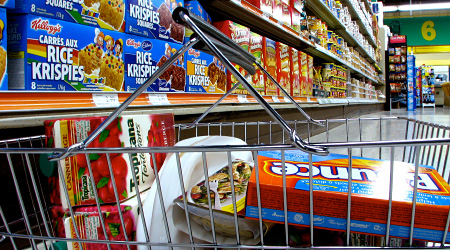10 Ways To Cut Food Costs

Purchasing food for the family can stretch any budget but there are many different ways to lower your food expense without sacrificing too much. The following ideas are 10 of the best ways to reduce food costs and maximize your purchasing power when shopping for groceries.
1. Cut Food Waste
Tossing food out which has either spoiled or become stale is like pulling money out of your wallet and throwing it directly into the garbage. Invest in a quality freezer which will allow you to buy in bulk and store the excess until you're ready to eat it. Making smaller meals can also eliminate leftovers if you're the type of family who prefers fresh meals.
2. Create Meal Plans
Menu planning is an integral part of cutting food costs because it forces family members to be creative when preparing meals. It also ensures healthy eating because menus can be created to use chicken, meat and fish throughout the week which can be paired with vegetables and other side dishes. Once you have an idea of what you're going to make you can make cost-efficient purchases at the grocery store.
3. Use a Grocery List
Using a list when going to the grocery store creates a plan of action and limits purchases to menu plan items only. Wasteful spending can easily double a grocery budget by purchasing items which are not needed for creating meals. Many grocery stores place items on end caps and at the checkout to encourage spontaneous buying by consumers, often for unhealthy products. If you stick to a list and you are less likely to fall for this gimmick.
4. Use Coupons
Coupons are essentially free money handed out by manufacturers to purchase their product. Keep in mind, a product should not be purchased just because you have a coupon. If you were planning on buying it anyways then using a coupon makes sense. Using weekly inserts and coupons printed online, you can clip and organize coupons you plan to use in the future to reduce your food costs by 25% or more.
5. Shop Alone
Just as too many cooks spoil the broth, too many shoppers will ruin a budget. Shopping alone will guarantee random items are not pulled off the shelf and thrown in the basket. It also allows you to stay focused and be efficient with your shopping by getting in the store, buying what you need and then leaving. It also means you are less likely to come home with a bunch of junk food that other family members wanted for themselves.
6. Split the Costs
Whether shopping at a bulk store or finding a great deal at a local grocery store, consider splitting the costs of your purchase with friends and family. It can be difficult to eat 10 pounds of oranges by yourself so buy a bag and then share with a friend. You can also plan on splitting costs in advance when making certain purchases especially for seasonal items like fruits and vegetables.
7. Stop Being Loyal
Only shopping at one grocery store because you're a loyal customer is a great way to guarantee increased food costs. Not every store is created equal nor do they run the same sales on the same products at the same time. By spreading around the love and shopping at other stores you enable yourself to buy what you want for the best prices, normally from a better selection. This comes in to play especially with weekly flyers and price matching.
8. Avoid Packaged Foods
Prepackaged foods will always be more expensive than buying the ingredients and preparing it yourself. This is because manufacturers are providing a convenience in addition to the product. Unfortunately, not only does this cost more financially but it is also likely to be more unhealthy since packaged foods are often high in sodium and other preservatives.
9. Don't Be Fooled
A big sale sticker or reduced price tag does not necessarily mean you're getting the better deal. Always use comparative shopping of similar products and other qualitative metrics to guarantee you're getting the best value for your dollar. Price per ounce is one of the better ways to determine if you're truly getting the best price for a given product. When combined with store coupons or shopper value cards, it takes a little effort to make sure you're not just being sold a bill of goods.
10. Double Check Receipts
A study was conducted which found over 80% of all errors on a grocery store receipt work to the benefit of the business and not the customer. It's quite convenient that every time there's an error it just happens to make the store a little richer. Don't let this happen to you so always double check your store receipt prior to leaving the premises to make sure you weren't overcharged for items you bought.







